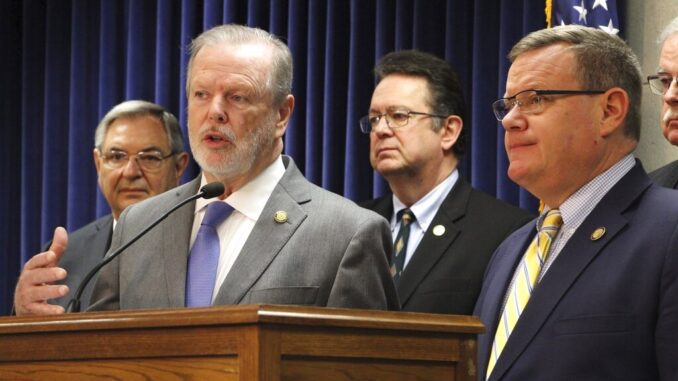
RALEIGH — As the Republican-led Medicaid expansion bill speeds toward passage, many in the GOP remain skeptical of the deal struck by legislative leaders.
Around 22 House Republicans voted against the bill on its third reading in February before the measure was sent to the Senate – and before the surprise announcement at a March 2 press conference that Senate Leader Phil Berger (R-Eden) and House Speaker Tim Moore (R-Kings Mountain) had struck a deal. According to some sources, there was no prior warning that the deal would be announced.
“Adopting Democrat talking points to deliver a victory for Democrats will do more to destroy the base’s trust in Republican leaders than it will ever improve healthcare access in North Carolina,” one Republican operative told North State Journal. “To completely reverse course (on expansion) isn’t just an embarrassing flip-flop with no explanation, it’s completely antithetical to Republicans’ limited-government mission.”
The bill, H.B. 76, passed the Senate Finance Committee on Wednesday, Mar. 8. It is expected to sail through the Senate Rules Committee and land on the floor of the chamber within the next week.
According to Berger and Moore, one of the conditions of the Medicaid expansion passage is the approval of the 2023-24 state budget. That, the theory of the leaders goes, will allow for potential tax cuts and other policy measures to gain approval in exchange for the deal long-sought by Governor Roy Cooper and state Democrats.
Part of the measure also makes a small number of changes to the state’s Certificate of Need (CON) laws. Those laws, instituted in 1978, require state regulatory approval for healthcare and hospital providers to build new facilities, enter new markets, and a host of other actions that are limited in state law.
The CON changes would remove psychiatric beds and facilities, chemical dependency treatment beds and facilities, replacement equipment up to $3 million, and various pediatric treatment services from review under the law.
In addition, the bill would exempt ambulatory surgical centers from CON review if those centers are licensed by the N.C. Department of Health and Human Services (NCDHHS), are located in a county with a population greater than 125,000, and commit 4% of their total earned revenue to charity care. The measure also removes MRI machines in counties with a population in excess of 125,000 from CON review. According to population estimates, 23 of North Carolina’s 100 counties would meet that threshold.
One of Berger’s and the Senate’s top staffers, Brent Woodcox, spent much of the week bashing the John Locke Foundation and WBT host Pete Kaliner over their concerns.
In a series of back-and-forth exchanges on Twitter, Woodcox said JLF CEO Amy O’Cooke’s positions “obviously don’t matter to the outcome here.”
In another, he criticized their professions, saying of the limited CON reforms in the bill, “Turns out radio rantings and white papers couldn’t get the job done.”
Beyond CON reform concerns, the issue of spending remains front and center.
One bill opponent, Rep. Neal Jackson (R-Moore), told North State Journal his opposition came from a desire to see spending cuts across government at every level.
“The reason I voted against Medicaid expansion is the same reason I will vote for the Convention of States legislation. The federal government is out of control with their spending, and someone has to stand up and say enough is enough,” said Jackson.
In a statement on Wednesday, another legislator, Rep. Ben Moss of Richmond County, announced he would oppose the final deal. Moss voted for the bill in February.
“I had originally voted for Medicaid expansion because I care about healthcare access in rural and underserved communities across the state,” said Moss, “Now having had more time to review the proposal and solicit feedback from my constituents, I’ve found that this proposal will have the opposite effect in the long-run, and it is bad news for my district, our state, and our nation. The heavy hand of government is not able to supplant the free market approach to keeping health care affordable for all.
Moss also called the expansion a “shortsighted approach” that would leave the state high and dry without addressing the roots of the problem. “When the federal government gets hit with higher-than-expected Medicaid costs, they have the ability to print more money and add to the growing national debt. North Carolina is required to have a balanced budget, so any higher costs means either higher taxes or spending cuts elsewhere,” Moss added.
Despite assurances that hospitals, particularly in rural areas will benefit from Medicaid expansion, the Foundation for Government Accountability (FGA) says the expansion has actually contributed to the closing of more hospitals.
The FGA study found that “While expansion proponents are fixated on one side of the ledger — uncompensated care costs — they often ignore the effect of shifting untold numbers of able-bodied adults from private insurance (whether through their employer or the individual market) onto Medicaid, which has lower provider reimbursement rates.”
The flip by Republican leaders has left many of the General Assembly’s longtime allies frustrated.
“Expanding Medicaid is a slap in the face to every Republican voter that took Republican legislative leadership at their word over the last decade. The dynamics of principled and practical opposition to expanding a costly government entitlement program have not changed – only leaderships’ willingness to resist special interest groups,” the GOP operative added.

